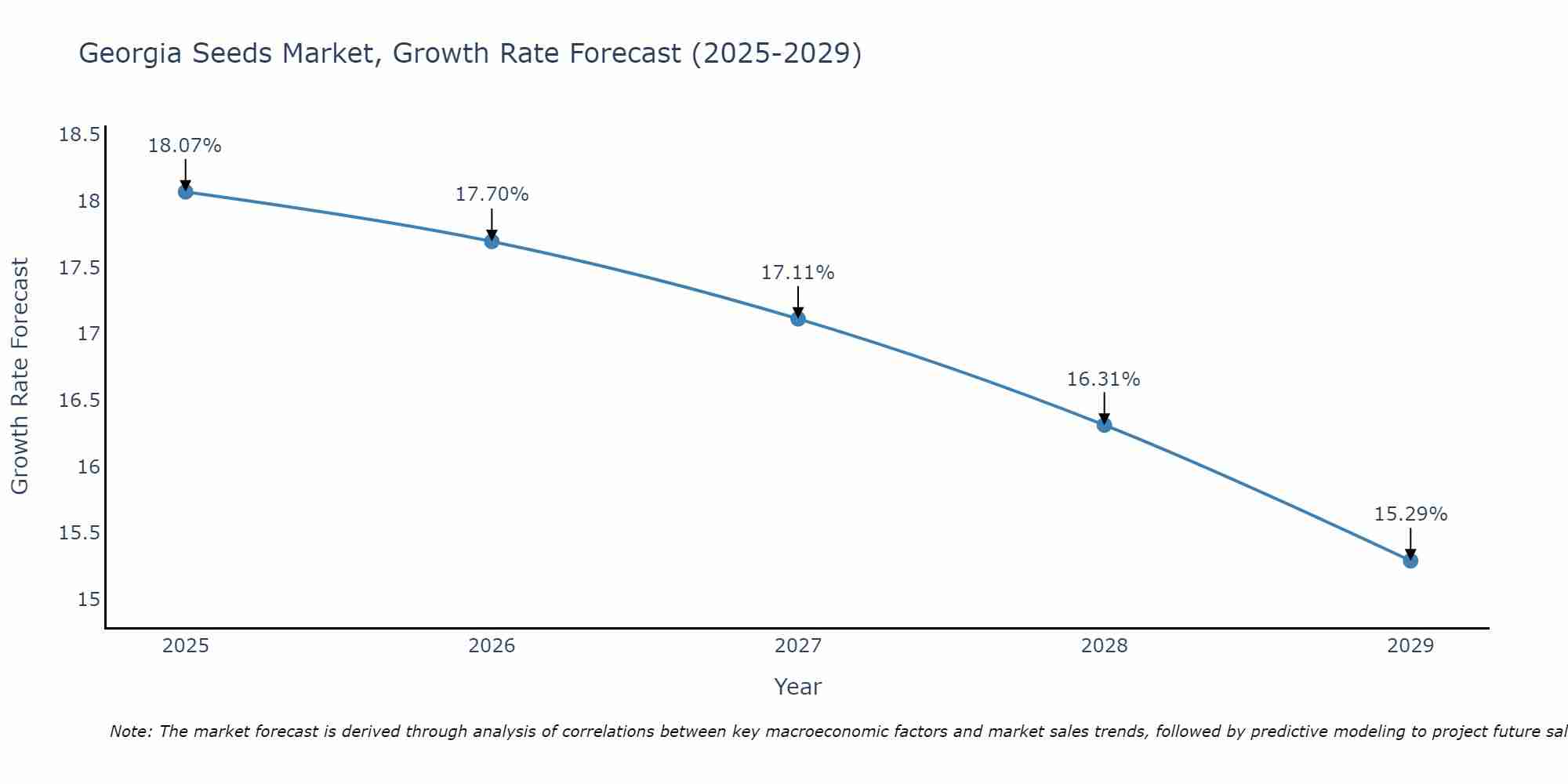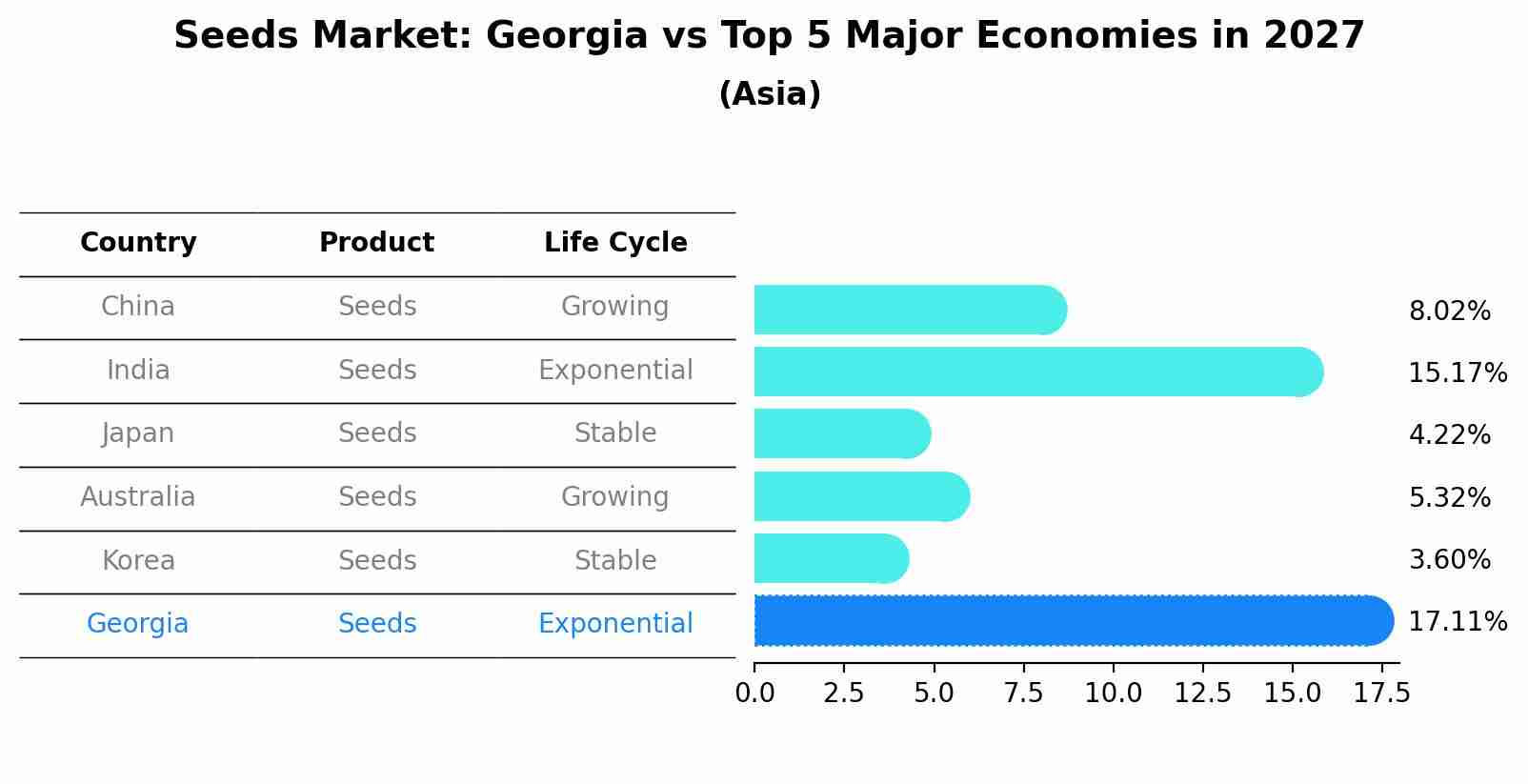Georgia Seeds Market (2025-2031) Outlook | Revenue, Size, Forecast, Share, Growth, Trends, Value, Companies, Analysis & Industry
| Product Code: ETC384720 | Publication Date: Aug 2022 | Updated Date: Jul 2025 | Product Type: Market Research Report | |
| Publisher: 6Wresearch | Author: Ravi Bhandari | No. of Pages: 75 | No. of Figures: 35 | No. of Tables: 20 |
Georgia Seeds Market Size Growth Rate
The Georgia Seeds Market may undergo a gradual slowdown in growth rates between 2025 and 2029. Beginning strongly at 18.07% in 2025, growth softens to 15.29% in 2029.

Seeds Market: Georgia vs Top 5 Major Economies in 2027 (Asia)
By 2027, the Seeds market in Georgia is anticipated to reach a growth rate of 17.11%, as part of an increasingly competitive Asia region, where China remains at the forefront, supported by India, Japan, Australia and South Korea, driving innovations and market adoption across sectors.

Georgia Seeds Market Synopsis
The Georgia Seeds Market is a thriving industry encompassing a diverse range of agricultural seeds, including corn, soybeans, wheat, and various vegetable seeds. With a favorable climate and fertile soil, Georgia offers ideal conditions for seed production. Major players in the market include multinational seed companies, local seed producers, and seed distributors. The market is experiencing growth driven by increasing demand for high-yield and genetically modified seeds that enhance crop productivity. Key trends in the Georgia Seeds Market include the adoption of advanced seed technologies, sustainable agriculture practices, and a focus on developing drought-resistant and disease-tolerant seed varieties. Government support for the agricultural sector and initiatives to promote seed research and development further contribute to the market`s expansion. Overall, the Georgia Seeds Market presents lucrative opportunities for stakeholders looking to capitalize on the region`s agricultural potential.
Georgia Seeds Market Trends
The Georgia Seeds Market is currently experiencing a shift towards sustainable and organic seed options, driven by increasing consumer demand for healthier and environmentally friendly products. There is a growing focus on non-GMO and heirloom seeds, as well as a rising interest in native plant species. Urban gardening and home cultivation have also contributed to the popularity of seeds tailored for small spaces and container gardening. Additionally, there is a trend towards online seed purchasing and direct-to-consumer sales, allowing for greater accessibility and convenience for customers. Overall, the Georgia Seeds Market is moving towards offering a wider variety of high-quality, sustainable seeds to meet the evolving needs and preferences of consumers in the region.
Georgia Seeds Market Challenges
In the Georgia seeds market, one of the key challenges faced is the increasing competition from both domestic and international seed companies, leading to pricing pressures and the need for continuous innovation to stay ahead. Additionally, fluctuating weather patterns and natural disasters can impact crop yields, affecting the demand for different types of seeds. Regulatory hurdles related to seed certification and intellectual property rights also pose challenges for seed companies operating in Georgia. Furthermore, the lack of awareness among farmers about the benefits of using high-quality seeds and the availability of counterfeit or low-quality seeds in the market further complicate the landscape. Overall, navigating these challenges requires strategic planning, strong research and development capabilities, and effective marketing strategies to succeed in the competitive Georgia seeds market.
Georgia Seeds Market Investment Opportunities
The Georgia seeds market presents promising investment opportunities in the agriculture sector due to the state`s favorable climate and growing demand for high-quality seeds. Key areas for investment include the production and distribution of hybrid and genetically modified seeds tailored to local conditions, as well as organic and specialty seeds to cater to the increasing consumer preference for sustainable and healthy food options. Additionally, investing in research and development to enhance seed technology and improve crop yields could provide significant returns in the long term. Collaborating with local farmers and agricultural associations to promote the adoption of advanced seed varieties and practices can also be a strategic investment approach in the Georgia seeds market.
Jordan Agar Market Government Policies
Government policies related to the Georgia Seeds Market include regulations on seed quality, labeling, and certification to ensure the production and sale of high-quality seeds. The Georgia Department of Agriculture oversees these policies, which aim to protect farmers and consumers by promoting the use of certified seeds that meet specific standards. Additionally, there are regulations in place to prevent the spread of invasive species through seeds and to maintain the integrity of the state`s agricultural industry. The government also supports research and development in the seed sector to enhance crop productivity and sustainability. Overall, these policies contribute to a thriving and competitive seeds market in Georgia while safeguarding the interests of both producers and consumers.
Georgia Seeds Market Future Outlook
The Georgia seeds market is poised for steady growth in the coming years, driven by increasing demand for high-quality seeds in the agriculture sector. Factors such as technological advancements in seed breeding and biotechnology, growing emphasis on sustainable farming practices, and the rising adoption of genetically modified (GM) seeds are expected to fuel market expansion. Additionally, the shift towards organic farming and the need for improved crop yields to meet the rising food demand will further boost the demand for seeds in the region. With a favorable climate and supportive government initiatives for agriculture, Georgia is likely to attract more investments in the seeds market, leading to innovation and product development, ultimately contributing to the overall growth and competitiveness of the industry.
Key Highlights of the Report:
- Georgia Seeds Market Outlook
- Market Size of Georgia Seeds Market, 2024
- Forecast of Georgia Seeds Market, 2031
- Historical Data and Forecast of Georgia Seeds Revenues & Volume for the Period 2021 - 2031
- Georgia Seeds Market Trend Evolution
- Georgia Seeds Market Drivers and Challenges
- Georgia Seeds Price Trends
- Georgia Seeds Porter's Five Forces
- Georgia Seeds Industry Life Cycle
- Historical Data and Forecast of Georgia Seeds Market Revenues & Volume By Type for the Period 2021 - 2031
- Historical Data and Forecast of Georgia Seeds Market Revenues & Volume By Genetically Modified (GM) Seed for the Period 2021 - 2031
- Historical Data and Forecast of Georgia Seeds Market Revenues & Volume By Conventional Seed for the Period 2021 - 2031
- Historical Data and Forecast of Georgia Seeds Market Revenues & Volume By Crop for the Period 2021 - 2031
- Historical Data and Forecast of Georgia Seeds Market Revenues & Volume By Field Crops for the Period 2021 - 2031
- Historical Data and Forecast of Georgia Seeds Market Revenues & Volume By Fruit & Vegetable Crops for the Period 2021 - 2031
- Historical Data and Forecast of Georgia Seeds Market Revenues & Volume By Availability for the Period 2021 - 2031
- Historical Data and Forecast of Georgia Seeds Market Revenues & Volume By Commercial Seeds for the Period 2021 - 2031
- Historical Data and Forecast of Georgia Seeds Market Revenues & Volume By Saved Seeds for the Period 2021 - 2031
- Historical Data and Forecast of Georgia Seeds Market Revenues & Volume By Seed Treatment for the Period 2021 - 2031
- Historical Data and Forecast of Georgia Seeds Market Revenues & Volume By Treated for the Period 2021 - 2031
- Historical Data and Forecast of Georgia Seeds Market Revenues & Volume By Untreated for the Period 2021 - 2031
- Historical Data and Forecast of Georgia Seeds Market Revenues & Volume By Seed Trait for the Period 2021 - 2031
- Historical Data and Forecast of Georgia Seeds Market Revenues & Volume By Herbicide Tolerant for the Period 2021 - 2031
- Historical Data and Forecast of Georgia Seeds Market Revenues & Volume By Insecticide Resistant for the Period 2021 - 2031
- Historical Data and Forecast of Georgia Seeds Market Revenues & Volume By Other Stacked Traits for the Period 2021 - 2031
- Georgia Seeds Import Export Trade Statistics
- Market Opportunity Assessment By Type
- Market Opportunity Assessment By Crop
- Market Opportunity Assessment By Availability
- Market Opportunity Assessment By Seed Treatment
- Market Opportunity Assessment By Seed Trait
- Georgia Seeds Top Companies Market Share
- Georgia Seeds Competitive Benchmarking By Technical and Operational Parameters
- Georgia Seeds Company Profiles
- Georgia Seeds Key Strategic Recommendations
Frequently Asked Questions About the Market Study (FAQs):
- Single User License$ 1,995
- Department License$ 2,400
- Site License$ 3,120
- Global License$ 3,795
Search
Thought Leadership and Analyst Meet
Our Clients
Related Reports
- Canada Oil and Gas Market (2026-2032) | Share, Segmentation, Value, Industry, Trends, Forecast, Analysis, Size & Revenue, Growth, Competitive Landscape, Outlook, Companies
- Germany Breakfast Food Market (2026-2032) | Industry, Share, Growth, Size, Companies, Value, Analysis, Revenue, Trends, Forecast & Outlook
- Australia Briquette Market (2025-2031) | Growth, Size, Revenue, Forecast, Analysis, Trends, Value, Share, Industry & Companies
- Vietnam System Integrator Market (2025-2031) | Size, Companies, Analysis, Industry, Value, Forecast, Growth, Trends, Revenue & Share
- ASEAN and Thailand Brain Health Supplements Market (2025-2031) | Strategy, Consumer Insights, Analysis, Investment Trends, Opportunities, Growth, Size, Share, Industry, Revenue, Segments, Value, Segmentation, Supply, Forecast, Restraints, Outlook, Competition, Drivers, Trends, Demand, Pricing Analysis, Competitive, Strategic Insights, Companies, Challenges
- ASEAN Bearings Market (2025-2031) | Strategy, Consumer Insights, Analysis, Investment Trends, Opportunities, Growth, Size, Share, Industry, Revenue, Segments, Value, Segmentation, Supply, Forecast, Restraints, Outlook, Competition, Drivers, Trends, Demand, Pricing Analysis, Competitive, Strategic Insights, Companies, Challenges
- Europe Flooring Market (2025-2031) | Outlook, Share, Industry, Trends, Forecast, Companies, Revenue, Size, Analysis, Growth & Value
- Saudi Arabia Manlift Market (2025-2031) | Outlook, Size, Growth, Trends, Companies, Industry, Revenue, Value, Share, Forecast & Analysis
- Uganda Excavator, Crane, and Wheel Loaders Market (2025-2031) | Strategy, Consumer Insights, Analysis, Investment Trends, Opportunities, Growth, Size, Share, Industry, Revenue, Segments, Value, Segmentation, Supply, Forecast, Restraints, Outlook, Competition, Drivers, Trends, Demand, Pricing Analysis, Competitive, Strategic Insights, Companies, Challenges
- Rwanda Excavator, Crane, and Wheel Loaders Market (2025-2031) | Strategy, Consumer Insights, Analysis, Investment Trends, Opportunities, Growth, Size, Share, Industry, Revenue, Segments, Value, Segmentation, Supply, Forecast, Restraints, Outlook, Competition, Drivers, Trends, Demand, Pricing Analysis, Competitive, Strategic Insights, Companies, Challenges
Industry Events and Analyst Meet
Whitepaper
- Middle East & Africa Commercial Security Market Click here to view more.
- Middle East & Africa Fire Safety Systems & Equipment Market Click here to view more.
- GCC Drone Market Click here to view more.
- Middle East Lighting Fixture Market Click here to view more.
- GCC Physical & Perimeter Security Market Click here to view more.
6WResearch In News
- Doha a strategic location for EV manufacturing hub: IPA Qatar
- Demand for luxury TVs surging in the GCC, says Samsung
- Empowering Growth: The Thriving Journey of Bangladesh’s Cable Industry
- Demand for luxury TVs surging in the GCC, says Samsung
- Video call with a traditional healer? Once unthinkable, it’s now common in South Africa
- Intelligent Buildings To Smooth GCC’s Path To Net Zero


















